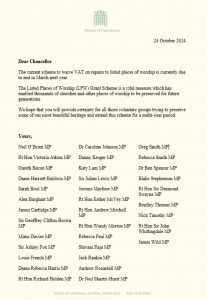John wrote an article for the Times setting out the reasons why he supported the Vote Leave Campaign.
The test of the article is as follows:
I have huge respect and admiration for the Prime Minister. Under his leadership, we have turned around an economy that, in 2010, was on its knees. I have no doubt that the great reforms that this government has introduced, from the introduction of universal credit to the expansion of academies, will be seen to have transformed the prospects of our country.
I was also immensely honoured to be asked by the Prime Minister to join his Cabinet after the election to do a job that I had always wanted to do. However, at the time that he did so, I also told him that I had already stated publicly that I could not support continued membership of the European Union under the existing terms of our membership and that I felt that there had to be a wholly new relationship.
As a schoolboy, I campaigned in the last referendum for Britain to stay in what was then called the Common Market. I did so because I have always believed in the benefits of free trade. However, I was also reassured by the clear promise that the sovereignty of our Parliament would be unaffected. The then Government’s leaflet delivered through every door stated clearly that “No important new policy can be decided in Brussels or anywhere else without the consent of a British Minister answerable to a British Government and British Parliament”.
Since that time, that key principle has been steadily eroded. The introduction of Qualified Majority voting allowing member states to be overruled has been extended into more and more areas under successive Treaty changes. Time and again, we are told that we must implement directives from Brussels that are against our national interest and that we opposed. At the same time, we are told that we cannot make changes to our own legislation because to do so will be in breach of European law.
I hoped that it would be possible for us to negotiate a new relationship with the EU whereby we cooperate on those areas where we choose to do so but we can also choose not to do so. This has proved impossible. The outcome of the Prime Minsiter’s negotiations does represent an improvement on the existing position. However, it falls a long way short of the new arrangement that I would like to see. In particular, it still means that our courts and Parliament have to comply with decisions taken in Brussels and that we have no ability to control our own borders. It is therefore clear to me that the only way we can regain control over these areas is by negotiating new agreements with Europe from outside the EU.
In the coming weeks, there will be much debate about what life would be like outside the European Union. Already some are drawing comparisons with the arrangements for Norway, Canada or Switzerland. However, we are like none of those countries. We are the fifth biggest economy in the world, one of 5 permanent members of the UN Security Council, a leading member of NATO and one of the G7. Outside the EU, we will continue to exert influence around the world and will be free to negotiate trade deals not just with the EU but also with countries like the US, China and India. We currently have a trade deficit with the rest of the EU of about £60 billion and so it is very much in their interests that we quickly conclude a new free trade arrangement. However, we will no longer be required to impose regulations on business which add up to a cost of over £33 billion. Nor will we have to go on sending over £350 million to Brussels each week and can instead spend that money on our own priorities.
For these reasons, I shall be supporting the Vote Leave campaign. However, I am pleased that thanks to this Conservative Government, it is the British people who will be able to decide.


